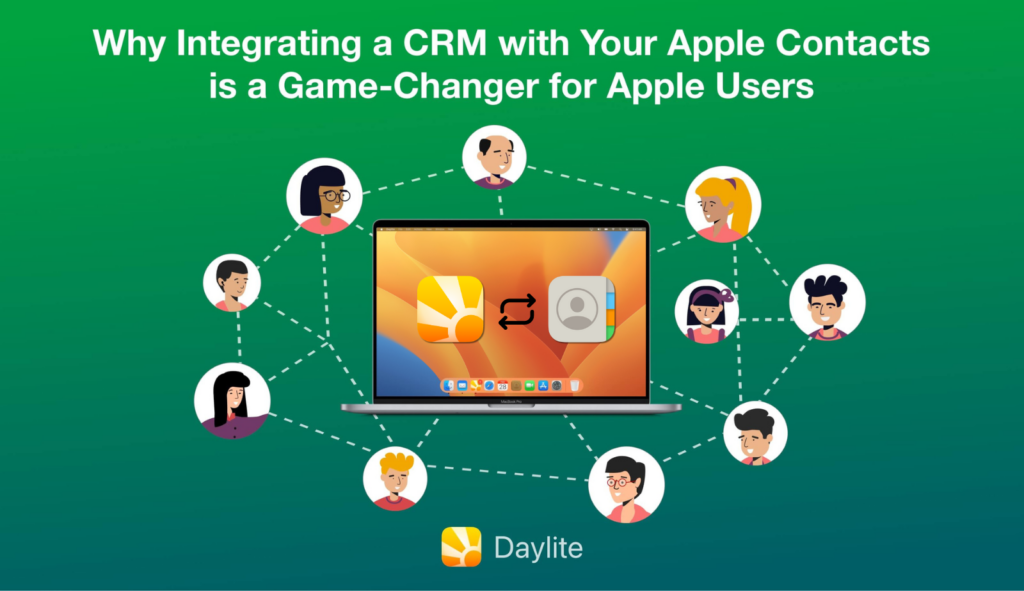Managing Apple Contacts may be enough for personal use, but when it comes to growing your business, integrating a Customer Relationship Management (CRM) system with Apple Contacts might be the key to successfully segmenting your customers, engaging in targeted communication, identifying upsell opportunities, and improving overall client satisfaction.
In this blog post, we will explore the potential of integrating a CRM system with Apple Contacts to segment clients and leads and boost targeted communication. We’ll also delve into the reasons why an Apple-based CRM should be your go-to option for seamless integration with Apple Contacts, and how to find the best CRM for Mac.

Your Apple Contacts likely include basic information like names, phone numbers, and email addresses. A simple contact list like that may work fine for everyday life, but you’ll need more extensive capabilities at your disposal to help your business grow.
That’s where CRMs come in.
When integrated with Apple Contacts, CRMs can also work as a customer segmentation software, enabling you to divide your audiences into groups to drive more engaged targeted communication. It makes it easy to follow up with leads and clients, and it helps you create custom strategies to communicate with each group in a more effective way.
The Benefits of Customer Segmentation for Small Business Owners
Customer segmentation is a staple business strategy that allows small businesses to divide their customer base into distinct groups based on shared characteristics and behaviors. By understanding the unique needs, preferences, and purchasing patterns of different customer segments, small businesses can tailor their efforts, optimize communication, and enhance the overall customer experience.
Most customer segmentation techniques involve dividing clients according to behavioral aspects such as purchase history, or demographics like location, age, and birthday; that way, you can ensure the emails, texts, newsletters you send reach the right customers at the right time, which in turn will bring greater results.
A CRM system can better assist a small business owner with customer segmentation by providing valuable insights and tools for effectively organizing and categorizing customer data. By analyzing the data from segmented client groups, businesses can identify trends, preferences, and opportunities. This data-driven decision-making approach allows small businesses to make informed choices about their services, prices, and overall growth plans.
To integrate Apple Contacts to your CRM, we recommend prioritizing software that offer contact manager for Apple devices specifically. That’s because every CRM system incorporates customer segmentation software capabilities, but some do so at higher levels and with greater detail.
So whether you need to send out a lead nurturing campaign or simplify your re-engagement efforts with your clients, having the help of a customer segmentation software will achieve these tasks with ease.
In other words, CRM segmentation is a vital concept you can leverage to help improve communication with your clients. Below, we’ll discuss what type of capabilities a CRM must have to integrate with Apple Contacts and how to choose the best CRM for Apple devices.
What to Look For in an Apple-Based CRM to Integrate with Apple Contacts
An Apple-based CRM will offer seamless integration with Apple devices and native apps, including Apple Contacts. If you’re an Apple enthusiast, rest assured that you can rely on an Apple-based CRM for enhanced integration and an elevated user experience for you and your team.
Another key benefit of using an Apple-based CRM is real-time sync, which allows any changes or updates you make in Apple Contacts to automatically update in your CRM contact list. Instead of manually inputting contact information, the integration allows you to sync contacts with just a few clicks. This automation minimizes the risk of errors and duplicate entries, so you can spend less time maintaining the contacts, enabling your team to focus on more valuable tasks that contribute to your business’s growth.
And, of course, Apple-based CRM systems are able to store, assess, and integrate data to create detailed customer profiles and compile useful information for your business decision-making.
Apple-based CRMs can also help improve the communication between your clients and your teams from different departments. By removing information silos, you can make sure that everyone in your team has access to the same information at all times, so you can always be on the same page and offer a better experience for clients.
When picking the best CRM for Mac, start by considering your business needs and objectives, and what success looks like to you when it comes to your goals. Ask yourself whether you are looking to improve your communication with clients, boost your marketing and sales results, or simply offer an enhanced client experience.
In addition, when choosing an Apple-based CRM, make sure to prioritize applications that are:
- Made for small businesses
- Easy to use
- Easy to integrate with contacts and calendars
- Scalable as your company grows
- Customizable for your unique needs
Choose Daylite CRM to Integrate with Your Apple Contacts
If you want to take back control of your small business so you can spend less time managing your client list, and more time building stronger relationships with them instead, Daylite CRM might be just what you need.
Daylite, the CRM software from Marketcircle, is a comprehensive tool that helps you keep track of client communications, enhance the client experience, track and report sales, and boost your project management skills. It is fully customizable to match your workflows, which makes it the perfect solution for you to regain control and spend less time managing your business.
When it comes to managing customer relationships and optimizing business processes, Daylite CRM is the ideal choice for small businesses seeking to leverage their Apple Contacts as it offers a seamless integration with Apple Contacts, as well as powerful segmenting tools, combining the best of both worlds.
Built exclusively for the Apple ecosystem, Daylite helps you streamline contact management, enhance communication, and unlock a range of productivity-boosting features. As an Apple-based CRM, Daylite certainly supports 2-way sync with the Apple Contacts app.
And as a plus, Daylite also allows real-time sync with the Apple Calendar app. Integrating calendar sharing in an Apple-based CRM like Daylite will ensure that you’re able to get extra reminders about your appointments, schedule appointments with Siri, and even look up travel times for your appointments in the Notification Center.
Daylite also offers the Daylite Mail Assistant, which is a direct integration with Apple Mail that allows you to take action from emails right from your inbox. It allows you to create and delegate tasks, create new projects and opportunities, and retain a full history of conversations all in one place. Additionally, you can create tasks and more in Apple Mail, and they will automatically be logged in Daylite.
Wrapping up
Having an Apple-based CRM integrated with Apple Contacts provides a wide range of capabilities, including comprehensive contact management, seamless contact syncing, segmentation and targeting, unified contact data view, and relationship history tracking. These capabilities empower small businesses to effectively manage contacts, streamline communication, improve customer engagement, and make informed decisions to drive business growth.
Daylite’s CRM technology is focused on supporting Apple-based small business owners and giving them back control of their business operations, so they have more time to do what they love. As you expand your company’s customer base, you’ll benefit from the scalability and customization of Daylite CRM.
If you’re looking for a tool to seamlessly integrate with your Apple Contacts and Apple Calendar, Daylite might be perfect for you. Sign up for a 14-day trial today.
About the author: Thanny Schmitz is a seasoned copywriter and content strategist passionate about technology and entrepreneurship. With over a decade of experience, Thanny has been behind insightful articles and blogs that inform and spark meaningful conversations within the ever-evolving spheres of tech and small business success.


